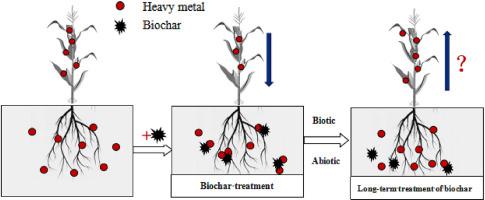Ecotoxicology and Environmental Safety ( IF 6.8 ) Pub Date : 2020-09-17 , DOI: 10.1016/j.ecoenv.2020.111261 Jie Wang 1 , Liang Shi 1 , Lulu Zhai 1 , Haowen Zhang 1 , Shengxiao Wang 1 , Jianwen Zou 2 , Zhenguo Shen 3 , Chunlan Lian 4 , Yahua Chen 5

|
Currently, the research and application of biochar in the remediation of heavy metal contaminated soil has become a hotspot, especially regarding the remediation of agricultural land. Biochar has been proved to be effective in reducing the content of available heavy metals in the soil as well as the heavy metals in plants. However, the long-term effectiveness of biochar immobilization has not been widely studied. In this review, retrospective search was carried out on the published literature results concerning remediation effects of biochar on different areas of heavy metal contaminated soil in the recent years, its application in field remediation (several years), and some potential abiotic and biotic factors that may weaken the immobilization effects of biochar. This results indicate that: (1) biochar is widely used in the remediation of heavy metal contaminated soil in different areas and has excellent immobilization effect. (2) Most of the research demonstrate that the immobilization effect of biochar is effective for 2–3 years or according to few results even for 5 years. However, there have been various reports claiming that the immobilization effect of biochar decreases with time. (3) Abiotic factors such as acid rain, flooded environment, changes in soil condition (pH, redox and dissolved organic matter) and changes in biochar (Cl− and alkali leaching) can significantly weaken the immobilization effect of biochar. (4) Biotic factors such as plant roots, earthworms and soil microorganisms can also significantly reduce the immobilization effect of biochar. Therefore, field experiments having longer time span with biochar need to be further carried out, and the developmental research of modified biochar with a more stable immobilization effect also needs further attention.
中文翻译:

生物炭固定化修复在重金属污染土壤上的长期效果以及削弱修复效果的潜在环境因素分析:综述。
目前,生物炭在重金属污染土壤修复中的研究与应用已经成为一个热点,特别是在农田修复方面。生物炭已被证明可有效减少土壤中有效的重金属含量以及植物中的重金属含量。但是,生物炭固定的长期有效性尚未得到广泛研究。在这篇综述中,对近年来发表的有关生物炭对重金属污染土壤不同区域的修复效果,其在田间修复中的应用(多年)以及一些潜在的非生物和生物因素进行回顾性研究。可能会削弱生物炭的固定作用。结果表明:(1)生物炭广泛应用于不同地区重金属污染土壤的修复,具有极好的固定效果。(2)大多数研究表明,生物炭的固定作用有效期为2年至3年,甚至很少见,甚至持续5年。然而,已有各种报道声称生物炭的固定作用随时间降低。(3)非生物因素,例如酸雨,洪水泛滥,土壤状况的变化(pH,氧化还原和溶解的有机物)和生物碳的变化(Cl 有各种报道声称生物炭的固定作用随时间而降低。(3)非生物因素,例如酸雨,洪水泛滥,土壤状况的变化(pH,氧化还原和溶解的有机物)和生物碳的变化(Cl 有各种报道声称生物炭的固定作用随时间降低。(3)非生物因素,例如酸雨,洪水泛滥,土壤状况的变化(pH,氧化还原和溶解的有机物)和生物碳的变化(Cl-和碱浸)会大大削弱生物炭的固定作用。(4)植物根,earth和土壤微生物等生物因素也可大大降低生物炭的固定作用。因此,需要进一步进行生物炭时间跨度较长的田间试验,固定化效果更稳定的改性生物炭的开发研究也需要进一步关注。


























 京公网安备 11010802027423号
京公网安备 11010802027423号